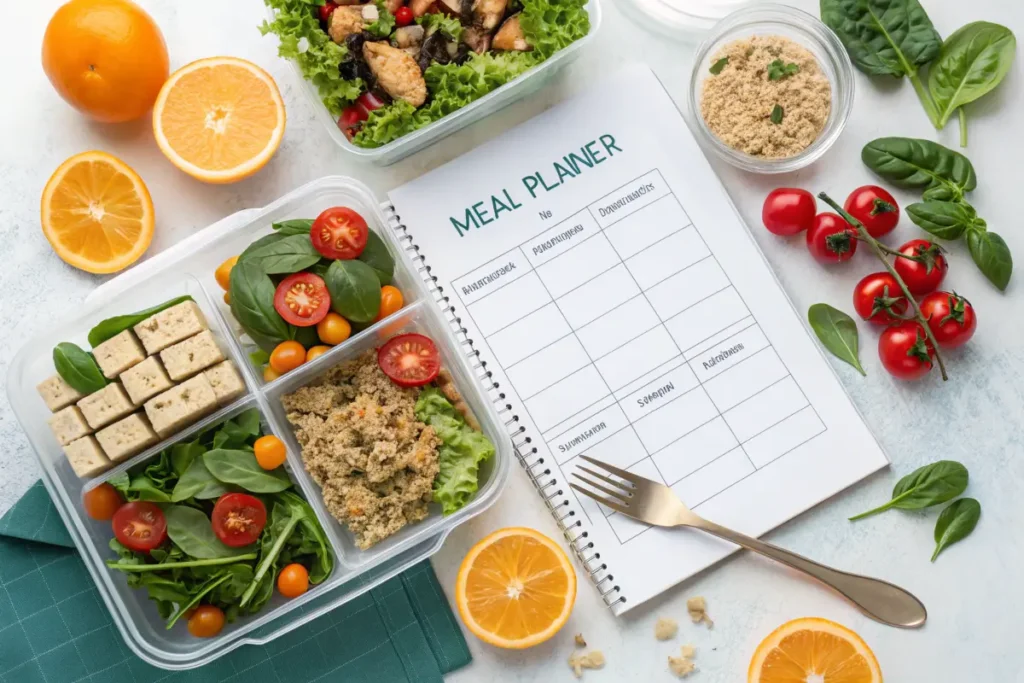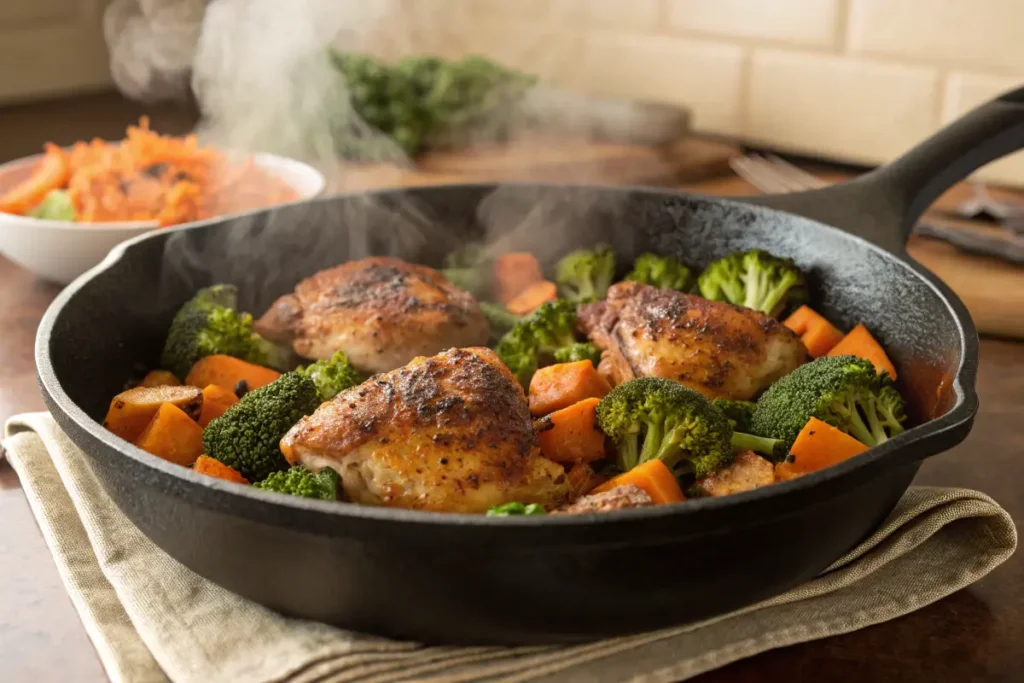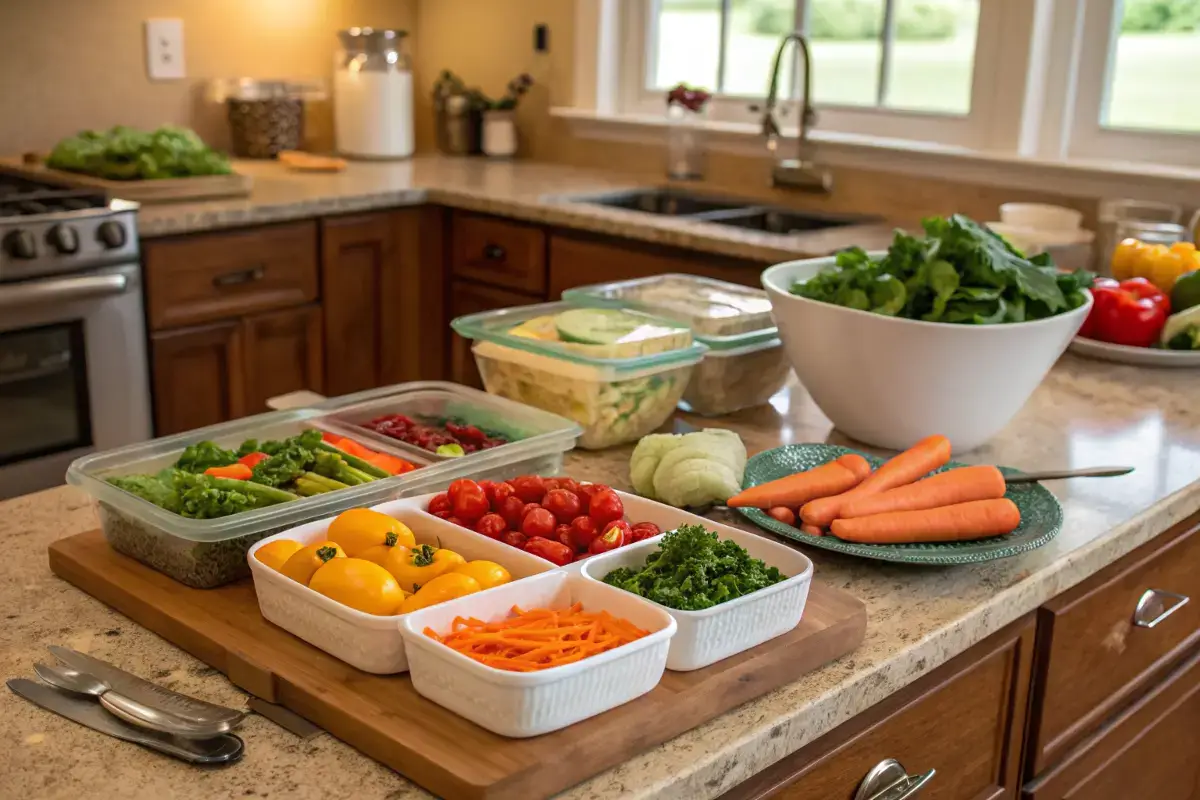Meal prepping is a game-changer for anyone looking to save time, cut costs, and eat healthier. Whether you’re a busy professional, a student, or just someone who wants to streamline their meals, meal prep can simplify your life while boosting your wellness. In this guide, we’ll cover everything from beginner-friendly meal prep ideas to advanced tips for seasoned planners. You’ll discover creative recipes, practical tips, and strategies to make meal prep an effortless and rewarding habit.
Let’s kick things off by diving into the basics!
Introduction to Meal Prep
What is Meal Prep and Why Does it Matter?
Meal prep, short for meal preparation, is all about planning and preparing meals in advance. It could mean cooking a big batch of meals for the week or simply organizing your ingredients for quick assembly. Why does this matter? Because it frees up time during busy days, ensures you stick to your healthy eating goals, and keeps stress at bay when hunger strikes.
By prepping your meals ahead, you’ll avoid the dreaded last-minute takeout runs or reaching for unhealthy snacks. Instead, you’ll have nutritious, pre-portioned options ready to go. Whether you’re whipping up salads, soups, or snacks, meal prep puts you in control of what you eat—no more guesswork!
Benefits of Meal Prep: Saving Time, Money, and Stress
Meal prep is a win-win for your schedule and wallet. Here’s how:
- Save Time: Batch-cooking cuts down on daily kitchen time. Just a few hours of prep can cover your whole week.
- Save Money: Shopping with a plan reduces impulse buys and food waste. You’ll stick to your grocery list and make the most of pantry staples.
- Save Stress: Knowing that your meals are sorted means one less thing to worry about, especially on hectic workdays.
Meal prep is more than just a trend—it’s a lifesaver for anyone juggling a busy lifestyle. Up next, we’ll dive into how beginners can ease into this habit with confidence!
Beginner’s Guide to Meal Prep
Setting Realistic Goals for Meal Prep
If you’re new to meal prep ideas, starting small is the key to long-term success. Instead of aiming to prep every single meal, focus on one or two meals for the week. For example, start with breakfast or lunch, which are often the hardest to grab on the go.
Think about your lifestyle and eating habits. Are you always rushing in the mornings? Or do you struggle to find healthy options for lunch at work? Use this information to guide your planning. Setting realistic goals helps prevent overwhelm and keeps you motivated to stick with your routine.
Essential Tools and Supplies for Successful Meal Prep
Investing in the right tools can make meal prepping feel like a breeze. At the very least, you’ll need:
- Airtight containers to keep food fresh.
- A sturdy cutting board and sharp knife for quick prep.
- Measuring cups and spoons for portion control.
- A slow cooker or sheet pan for hands-off cooking.
Additionally, keeping your pantry stocked with essentials like spices, grains, and canned goods saves time and keeps your budget in check. For inspiration on high-protein recipes perfect for beginners, check out Top Fitness Meals’ guide.
How to Overcome Common Challenges in Meal Prep
Feeling stuck or uninspired? You’re not alone. Many beginners find it tough to balance variety and simplicity. To tackle this, rotate a few favorite recipes weekly while experimenting with one new dish. For example, batch-cooking a casserole like this Chicken Florentine Casserole provides multiple meals with minimal effort.
Running out of time? Meal prep doesn’t have to happen in one go. Spread tasks over a couple of days—chop veggies one night and cook proteins the next. And remember, meal prep is about making life easier, not perfect meals every time.
Weekly Meal Prep Planning Tips

How to Plan Your Meals Based on Your Schedule
Planning is the foundation of successful meal prep ideas. Begin by reviewing your week ahead. Are there days when you’ll eat out or need quick meals on-the-go? Block out those times and focus on prepping meals for the remaining slots.
For busy workdays, consider prepping meals that are easy to reheat, such as soups, stews, or stir-fry. Save recipes requiring fresh assembly, like salads or wraps, for lighter activity days.
Taking Inventory of Pantry and Freezer Essentials
Before heading to the grocery store, shop your own kitchen! Check what’s already in your pantry and freezer. Found a bag of quinoa or a can of chickpeas? Great! Use them as the base for your meals.
Incorporating these staples not only saves money but also reduces food waste. For freezer-friendly meals that work well for long-term storage, try recipes like Lemony Salmon Orzo Casserole.
Building a Flexible and Balanced Weekly Meal Plan
Your weekly plan should balance meal prep ideas with flexibility. For example, prep breakfasts and lunches for the entire workweek but leave dinner options open for spontaneity.
Aim to include a variety of proteins, veggies, and whole grains in each meal. For inspiration, this list of healthy dinner recipes offers quick options to round out your meal plan.
Top 10 Easy and Creative Meal Prep Ideas
One-Pan and Sheet Pan Recipes

When it comes to effortless meal prep ideas, one-pan or sheet pan recipes are your best bet. These dishes are low on prep time and high on flavor. Toss your favorite proteins and vegetables with seasonings, bake them on a single sheet pan, and you’re set. For example, a one-pan meal like Teriyaki Chicken Skillet Casserole combines simplicity with bold, savory flavors.
Not only do these recipes save on cleanup, but they’re also incredibly versatile. Swap ingredients to suit your preferences or use up leftover veggies from your fridge.
No-Reheat Meal Prep Options
If you’re always on the go, consider no-reheat meal prep ideas. Cold lunch bowls, salads, and wraps can be prepped in advance and enjoyed straight from the fridge. For example, a vibrant quinoa and veggie salad holds up well throughout the week and doesn’t require heating.
Pair your meals with hearty toppings like roasted chickpeas, grilled chicken, or avocado for a filling, satisfying option.
Salad Jars and Layered Lunch Bowls
Layered salads in mason jars are not only visually appealing but also incredibly practical. The trick? Add your dressing to the bottom and layer sturdy ingredients like grains and proteins first, finishing with delicate greens on top.
Lunch bowls are another fantastic option for meal prepping. Start with a base like brown rice, sweet potatoes, or greens, and layer on proteins, veggies, and a flavorful sauce. For creative bowl inspiration, try recipes like Chicken Florentine Casserole that can double as a base for meal prep bowls.
Kid-Friendly Meal Prep Ideas
For families, meal prep ideas should appeal to both kids and adults. Mini quesadillas, baked pasta cups, or fruit parfaits are sure to please younger palates. Prep these in advance to save time on busy school mornings or after-school snack runs.
Vegan and Vegetarian Meal Prep
Plant-based meal prep is easier than you think! Dishes like lentil stews, chickpea curry, or roasted veggie quinoa bowls are packed with nutrients and flavor. They’re also budget-friendly, making them ideal for larger batches. Check out Top Fitness Meals’ guide for creative vegetarian ideas that pack a protein punch.
Healthy Breakfast Prep Ideas
Starting your day with a healthy breakfast sets the tone for success. Prep ideas like overnight oats, chia pudding, or egg muffins are simple yet nutritious. These options can be customized with your favorite fruits, nuts, or spices. For inspiration, read about high-protein breakfast recipes.
Protein-Packed Snack Boxes
Snacks are often overlooked in meal prep, but they’re essential for keeping energy levels stable throughout the day. Assemble snack boxes with boiled eggs, cheese, nuts, and fresh fruit for a balanced, protein-packed boost.
Freezer-Friendly Dinners
Freezer meals are a lifesaver for hectic evenings. Make dishes like casseroles, soups, or lasagnas in bulk and freeze individual portions. When needed, simply thaw and reheat for a quick and hearty dinner. Recipes like Lemony Salmon Orzo Casserole are perfect freezer-friendly options.
30-Minute Prep Recipes for Busy Weeknights
Not all meal prep has to be done in bulk. Quick recipes that come together in 30 minutes can save the day when you’re short on time. Stir-fries, tacos, or skillet dishes are perfect examples of fast yet satisfying meals.
Customizable Meals for Picky Eaters
For households with varied tastes, customizable meals are a great solution. Set up a taco bar, pasta station, or baked potato bar with toppings to suit everyone’s preferences.
Advanced Tips for Meal Prep Success
Batch Cooking vs. Prepping Individual Meals
When it comes to advanced meal prep ideas, you might find yourself debating between batch cooking and individual meal prepping. Batch cooking involves making large portions of a dish—like chili or soup—that you can eat over several days or freeze. It’s a time-saver and allows for plenty of leftovers.
On the other hand, prepping individual meals means creating fully-portioned dishes ahead of time. This approach works well if you prefer variety during the week or need grab-and-go options.
How to Store Meals Safely to Avoid Food Waste
Proper storage is key to extending the shelf life of your prepped meals. Invest in airtight containers and label everything with the date it was prepared. Keep cooked proteins and grains in the fridge for up to 4 days, while freezer-safe meals can last up to 3 months.
For meals with delicate ingredients like salads, store dressing separately to prevent sogginess. For tips on storing freezer-friendly meals, check out Top Fitness Meals.
Incorporating Seasonal Ingredients into Your Meal Prep
Take advantage of seasonal produce to keep your meal prep fresh and exciting. Winter squash, summer berries, or autumn root vegetables can transform ordinary dishes into flavorful, seasonal creations. Seasonal ingredients are often more affordable, too, so they’re a great way to stay on budget.
Meal Prep on a Budget
Money-Saving Tips for Meal Prep
Meal prepping doesn’t have to break the bank. With a little planning, you can create affordable meals that are healthy and delicious. Start by buying in bulk—grains, beans, and frozen vegetables are budget-friendly staples that stretch across multiple meals.
Another tip? Stick to seasonal produce. Fruits and vegetables in season not only taste better but also cost less. For example, plan meal prep ideas around summer squash or winter root veggies depending on the time of year.
Additionally, embrace meatless meals once or twice a week. Plant-based proteins like lentils and chickpeas are less expensive and just as filling as animal-based options.
Using Inexpensive Ingredients Without Sacrificing Taste
You don’t need fancy ingredients to create flavorful dishes. Simple pantry staples, like canned tomatoes, spices, and garlic, can transform a basic recipe into something extraordinary.
For protein, opt for budget-friendly cuts like chicken thighs or ground turkey. Pair these with versatile sides like roasted potatoes, rice, or pasta. Using freezer staples also helps reduce costs while maintaining variety.
When in doubt, batch-cook affordable classics like chili, soups, or casseroles. These meals freeze well and can be enjoyed for days.
Repurposing Leftovers into New Meals
Another way to save money is by repurposing leftovers into fresh dishes. Turn last night’s roast chicken into chicken salad wraps or add leftover rice to a hearty stir-fry. Creativity ensures nothing goes to waste while keeping your meals exciting.
FAQs on Meal Prep Ideas
What Are the Best Containers for Meal Prep?
The right storage containers make a huge difference in your meal prep success. Opt for BPA-free, microwave-safe containers with tight lids to keep food fresh. Glass containers are great for reheating, while plastic ones work well for lightweight storage. Look for divided containers to keep ingredients separate and fresh.
How Long Do Meal Preps Stay Fresh?
Generally, cooked meals stay fresh in the fridge for 3-4 days. For longer storage, freeze meals in individual portions and thaw as needed. Make sure to refrigerate prepped meals within two hours of cooking to maintain safety and flavor.
How Can I Make Meal Prep More Interesting?
To avoid boredom, rotate your recipes weekly and try new spices, sauces, or cuisines. Incorporate a mix of textures and flavors—think crunchy roasted veggies, creamy dressings, or zesty marinades. Don’t forget to customize meals with your favorite toppings or garnishes!
Conclusion and Call-to-Action
Why Meal Prep is the Key to a Balanced Lifestyle
Meal prepping is more than a time-saver—it’s a tool that simplifies your life, saves money, and supports healthier eating habits. By planning and preparing meals in advance, you avoid last-minute takeout decisions and ensure you have nutritious options at your fingertips. Whether you’re a busy professional, a student, or managing a family, implementing meal prep ideas can make your week more organized and stress-free.
From quick one-pan dishes to freezer-friendly casseroles, the possibilities for meal prep are endless. You don’t need to be a culinary expert to get started—just a bit of planning, some staple ingredients, and creativity can go a long way.
Your Turn: Start Your Meal Prep Journey Today!
Ready to take control of your meals and your time? Start small—prep breakfast or lunch for the week ahead, or batch-cook a family favorite to stock your freezer. Use this guide as your go-to resource for inspiration and tips. The key is to stay consistent and adapt the process to suit your lifestyle.
For more creative meal prep ideas, check out our other recipes and resources. Let meal prep empower you to eat better, save time, and enjoy a healthier lifestyle!

